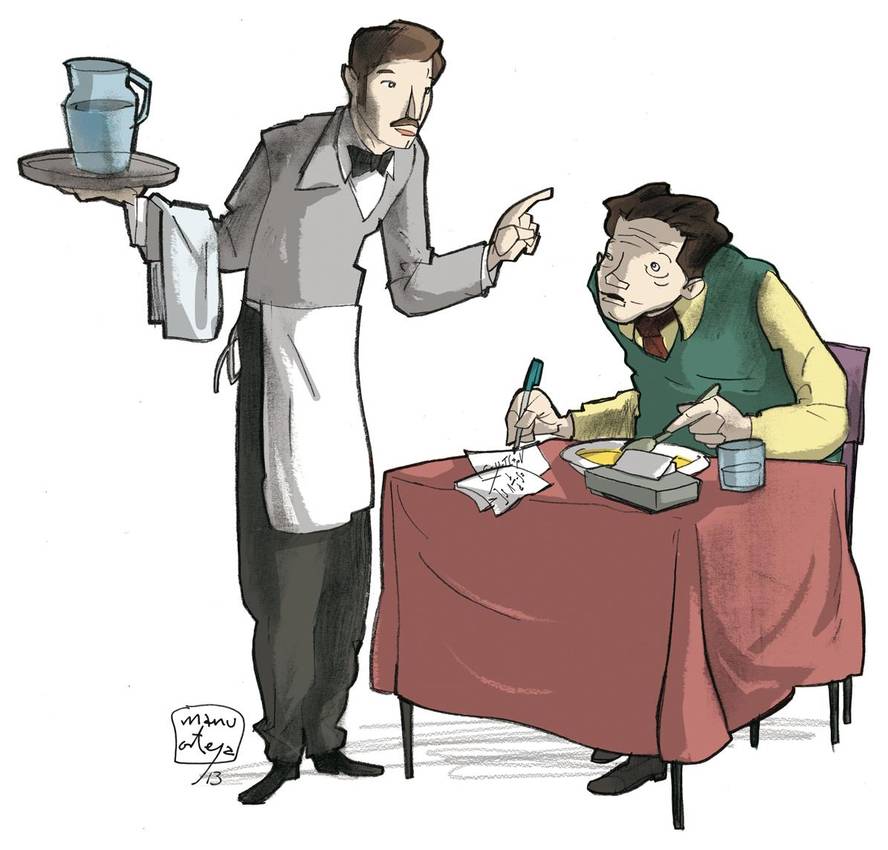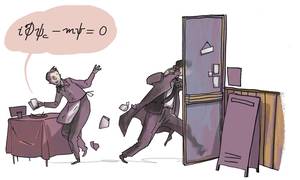Ettore Majorana, a genius who decided to disappear
1960. In a hotel in Buenos Aires, the waiter looks at a man having dinner. He has never seen it before, but he has been drawn to write mathematical formulas on paper napkins. As eternal. He approaches and tells him: "Do you know that I know a man who does the same thing? It comes from time to time and is also dedicated to outlining mathematics in napkins, like you. He is called Ettore Majorana and was a famous physicist in Italy, before the war, until he left the country and came here."
Chilean physicist Carlos Rivera was aloud with the words of the server. He knew that name well. He was one of the greatest physicists in history, but he disappeared in 1938, at the age of 32, and since then no one has heard of it.
Enrico Fermi himself said: "There are scientists of different categories in the world. Those of second or third do everything possible, but they never arrive very far. Then there are those of first order, those who make important discoveries, fundamental for the progress of science. But then there are geniuses like Galileo and Newton. It was one of those majoranas".
In early 1928, Fermi met the genius ten years earlier. Fermi, director of the Institute of Theoretical Physics at the University of Rome, receives a 21-year-old Sicilian. He studied engineering, but his friends Edoardo Amaldi and Emilio Segre, who knew well his extraordinary intelligence, turned him into theoretical physics and convinced him to go and speak with Fermi. Fermi explained what they were doing and, among other things, spoke to him of a statistical model of the atom (model Thomas-Fermi), while teaching him a table of numbers. He was silent and shy. Fermi listened with attention and without saying anything told and left. The next day a spreadsheet appeared again in the hand. I wanted to see Fermi's table; after comparing it with her page, she said Fermi's work was fine. Then he left again.
The following week he began his doctorate with Fermi. He finished his thesis in a year on quantum mechanics of radioactive nuclei. And he continued to investigate nuclear physics with Fermi. They formed a large group, known as "ragazzi di via Panisperma" (for being the institute in that street). In this group were also friends Segre and Amaldi. Each member of the group had an alias feligresa. Fermi was Pope, and Majorana, who was rigorously criticizing his works, was given the Grand Inquisitore.
The head of the majoran was never standing. When traveling on the tram, he was often presented with a new idea or theory. He would then begin to search for pencil in the pockets and make calculations in the tobacco pack. Then, jump from the tram and run to the institute. I would explain the idea to Fermi or some other member showing the tobacco pack. "Great! Write and publish! ", or something similar. But "What is going! It is a nonsense! ", the answer was the usual one. Once the last cigarette was collected, the pack full of numbers ended up in the bin. These calculations were too easy for Majorana, insignificant.
Something like this happened when Joliot and Curie, without knowing it, found a neutron. The marriage discovered the existence of neutral particles capable of getting into the matter and expelling protons. They were thought to be photons, since at that time no other neutral particles were known. Majorana explained to Fermi that this was impossible because the photons have no mass and to expel the proton it had to have at least one particle of the same mass. Fermi told him to publish this interpretation. But he did not listen to him. That was also too easy, it was obvious, it could do any. It was made by James Chadwick and was delivered in 1935 by the discovery of the neutron.
In early 1933 he travelled to Germany, with a scholarship, to work with the prestigious Werner Heisenberg. In addition to a brilliant scientist, he found a great friend in Heisenberg. But in autumn he becomes sick from Germany, with acute gastritis and neurasthenia. From then on he became more introverted. He began to go less and less to the institute, even stopped being with his friends. He lived almost without leaving home.
He returned in 1937. He explained to Fermin a question related to the equations of Dirac. He, fascinated, told him to publish it immediately. But in memory of the neutrons, Fermi himself wrote and sent the article on behalf of Majorana. The currently known as Majorana fermiones were in this article. Last year one of these was first detected.
That same year he takes the chair of physics of the University of Naples. And he began to teach theoretical physics. But that work did not do him well. Very few students were going to him, most were not able to follow his lessons.
In March 1938 he wrote two letters in Naples on 25. He left one in the hotel room, directed to his family: "I have only one desire: I don't wear black. If you need to follow customs, use any other sign for mourning, but not more than three days. Then keep me in the heart and, if you can, forgive me." The second letter was sent to Antonio Carrelli, director of the Institute of Physics of the University of Naples: "I have made an inescapable decision. There is no selfishness in the decision, but I know that my unexpected disappearance is going to be a problem for you and for students. I apologize, above all, for the trust, friendship and generosity that has contributed me for having abandoned me." That night he took the boat for Palermo.
From Palermo he sent a telegram to Carrelli telling him not to heed the previous letter. And then another letter: "Dear Carrelli, the sea has denied me without remedy. Tomorrow I will return...". But he did not return.
There were several hypotheses: suicide, retreat to a monastery, beggar... But these hypotheses lost strength when it was discovered that before disappearing he had taken out of the bank a lot of money. Then appeared the tracks that led to South America: they saw him in a hotel... But nothing was never clarified.
Fermi had it clear, he told his wife: "Ettore was too fast. If he has decided to disappear, no one will be able to find it."







